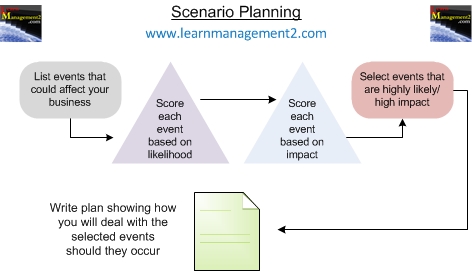|
|
LEARN MANAGEMENT2 .com |
Home | Business Management Concepts | About LearnManagement2 Business Presentations | Business Management Clip Arts| LearnManagement Blog HOME OF BUSINESS MANAGEMENT THEORY AND CONCEPTS For Business Management Learners Across The Globe |
SCENARIO PLANNINGIntroduction
Earlier we talked about crisis management which was all about managing a situation after the event has occurred. In contrast Scenario Planning involves managing situations before they occur; predicting future events and coming up with strategies to deal with them.
How to Predict/Choose Scenarios to Plan For
One way of trying to predict future scenarios is to look at the your Marketing Environment Analysis and list any events that could happen to things in your marketing environment and affect your business. For example if a firm is reliant on four suppliers to build their product, what would happen if some of your suppliers ceased trading. How would this impact on your business? If the scenario list is long, it may be sensible to plan for the most likely events or the events that will have the greatest impact on the business.
Scenario Planning Example
We all know that oil is a natural fuel that will run dry within 60-70 years; Oil firms therefore need to investigate alternatives sources of energy. If they do not, they will not be able to trade once oil supplies have finished.
Likelihood Rankings
When firms review predicted scenarios, it is common practice to rank each scenario based on how likely it is to happen. For example using a simple rating scale of 1-5, a rating of 5 could be used for scenarios highly likely to occur, 1 for unlikely and ratings 2, 3, 4 for anything with a likelihood in between these two ends of the scale. Using the above example of suppliers ceasing trade, if there is something happening in the supplier's environment that will affect its business such as a shortage of raw materials then the likelihood of it ceasing trade will be around 4 and 5. Whereas anything strengthening a supplier's business such as tax breaks, and excellent economic conditions will reduce the likelihood of a supplier ceasing trade down towards a rating of 1 and 2.
Preparing Your Plan
Once a firm has chosen the scenarios to plan for, it is time to write a scenario management plan. The plan needs to detail how the firm will deal with the situation if it occurs. A scenario plan should list each scenario, what action will be taken should it occur and what actions need to be completed to enable the firm to deal with the scenario. For example if a suppliers ceases trade then the action to deal with this could be to use alternative suppliers. To enable the firm to switch to alternative suppliers it needs to prepare a list of alternative suppliers and if applicable agree provisional contracts with them. For further advice on writing your plan click on this link Project Planning.
Conclusion
Scenario planning is an important part of the Strategic Management Process, it helps firms to prepare for events (that may affect them) and manage their impact. During the planning process it may not seem like a good use of time and resources but if any of the scenarios planned for occur, it will be prove to have been an invaluable exercise; it may even create a competitive advantage for the firm and deal with weaknesses in the firm's infrastructure.
Studying Marketing Visit www.learnmarketing.net
|

